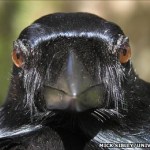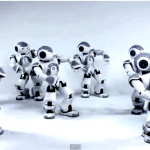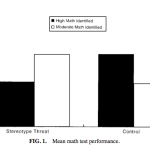intelligence
And the #1 blog entry published thus far in 2017 discussed whether there was an evolutionary advantage to being stupid:
----
As I was looking through the scientific literature the other day, I came across an article published in 1973, "The Evolutionary Advantages of Being Stupid." With a title like that, how could I not read it?
In this article Dr. Eugene D. Robin discussed how larger and more complex brains are associated with greater intelligence, which by evolutionary standards was thought to be related to "superiority." He described how this line of thinking places man at the peak of…
Sara Letzner had humans compete against pigeons in a behavioural experiment. Photo from: Ruhr-Universitat at Bochum
A new study conducted by Drs. Sara Letzner and Onur Gunturkun (Ruhr-Universitat at Bochum) as well as Dr. Christian Beste (Technische Univeritat at Dresden) shows that pigeons are better than humans when it comes to multitasking. Their findings were published in Current Biology.
The findings from the study show that the mammalian cerebral cortex, with all of its cortical layers, is not the only type of brain that can perform complex tasks as birds do not have a…
By Copyleft [CC BY-SA 3.0, via Wikimedia Commons
As I was looking through the scientific literature the other day, I came across an article published in 1973, "The Evolutionary Advantages of Being Stupid." With a title like that, how could I not read it?
In this article Dr. Eugene D. Robin discussed how larger and more complex brains are associated with greater intelligence, which by evolutionary standards was thought to be related to "superiority." He described how this line of thinking places man at the peak of evolution resulting in our tendency toward an…
It must be Friday. I found myself perusing YouTube videos and I came across these showing pet tortoises that have figured out how to solve some interesting problems such as:
Using the doggie door to enter a house...
If that does not work, many have figured out how to just open the back door...
Some have even figured out how to open the refrigerator...
After watching these videos, I naturally went in pursuit of any information I could find as to whether tortoise intelligence has been tested scientifically. In support of many pet owner claims, tortoises do exhibit signs of…
Birds get such a bad rap when it comes to intelligence. Sure they have relatively small brains, but scientists have known they are similar to primates with respect to their cognitive abilities. New research published in the Proceedings of the National Academy of Sciences presents data showing how this apparent dichotomy is possible. They found that the brains of songbirds and parrots pack two times the number of neurons as a primate of similar size. This means that these birds are able to pack neurons more tightly than mammals, which allows them to fit more brain cells in a smaller…
Image of dodo bird skeleton and model By BazzaDaRambler - Oxford University Museum of Natural History ... dodo - dead apparently.Uploaded by FunkMonk, CC BY 2.0, https://commons.wikimedia.org/w/index.php?curid=20054563
Using computed tomography (CT) scans of an intact skull, researchers have discovered that extinct dodo birds (Raphus cucullatus), despite having a rather silly name, were actually pretty smart. Well, as smart as a pigeon at least, and pigeons are pretty smart. Dodos likely also had a good sense of smell based on measurements of the olfactory portion of…
Image from: www.beagleworld.net
I should have read this article before adopting my beloved pet, who is certainly not on the top 10 list of smart breeds.
A cute article from pet360.com published the top 10 smart breeds according to the American Kennel Club:
1. Border collie
2. German Shepherd
3. Bloodhound
4. Beagle
5. Labrador Retriever
6. Newfoundland
7. Belgian Malinois
8. Siberian Huskies
9. Golden Retriever
10. Australian Shepard
Did your dog make the top 10?
To find out what classifies these as the top 10 choices, see the article in Pet360.com
I'm weeks late to the party here. If you pay attention to atheist issues you've probably heard that a recent major meta-study* concludes that at the population level, atheists are a bit smarter than religious folks (mainly Protestant Americans and English in this case). Not dramatically so, but in a statistically significant way. The difference persists even if you control for gender and education level. This means that if you look only at poorly educated people, the unbelievers are a bit smarter, and likewise if you look only at highly educated people, or women, or men. Here are some…
Image of Dr. Brian Hare from Dognition website.
I just found out there is a website, Dognition, dedicated to helping you discover just how smart your furry friend is. The site claims that dogs are actually smarter than we think and that even the apparently dumbest dog is intelligent in one way or another. (There is hope for my dog after all!) The scientist behind the website is Dr. Brian Hare, Associate Professor of Evolutionary Anthropology at Duke University.
Skeptically Speaking #198 is now available for your listening pleasure. The main part of the show has Desiree Schell interviewing James Gould, co-author of Nature’s Compass: The Mystery of Animal Navigation.
Great book on animal migration
The 15 minute side bar has Desiree interviewing me about recent research on the New Caledonian crows (this research).
Visit the Skeptically Speaking site to download or listen to the podcast.
This week, we’re looking at some of the amazing abilities exhibited by our animal cousins. We’ll speak to James Gould, co-author of Nature’s Compass: The…
You may recall a prior post in which I talked about how intelligent crows are. In fact, there was a special on PBS demonstrating their ability to solve problems and even recognize human faces (HIGHLY recommended if you haven't yet had a chance to see it):
Watch A Murder of Crows on PBS. See more from Nature.
In a more recent study, Dr. Marzluff and colleagues used brain scans to demonstrate that crows not only remember faces, but they can also remember how they were treated by various people. In the study, his team captured 12 wild American crows while wearing latex "…
"Listen, and understand. That terminator is out there. It can't be bargained with. It can't be reasoned with. It doesn't feel pity, or remorse, or fear. And it absolutely will not stop, ever, until you are dead." -Kyle Reese, the Terminator
Sure, they may look innocent now. Maybe you think they'll even live peacefully with us and create nothing but beauty, as Florence + the Machine might have you believe with their song,
Cosmic Love.
But the apocalypse will soon be upon us. And I think that this cute fella may be just the thing that ushers it in.
NAO robot, courtesy of Aldebaran…
In the recent articles, blog posts, and comment threads about possible biological reasons for the continued gender disparity in tenured math and science faculty positions, the discussion seems to be divided between two groups: those who emphasize the social and cultural aspects involved in gender and intelligence, and those who emphasize the scientific evidence of standardized test performance. The science team rails against "political correctness," claiming that by questioning the merits and motives of scientific hypotheses of differences in innate intelligence between different groups of…
The title of John Tierney's recent column in the New York Times, "Daring to Discuss Women's Potential in Science", suggests that Tierney thinks there's something dangerous about even raising the subject:
The House of Representatives has passed what I like to think of as Larry's Law. The official title of this legislation is "Fulfilling the potential of women in academic science and engineering," but nothing did more to empower its advocates than the controversy over a speech by Lawrence H. Summers when he was president of Harvard.
This proposed law, if passed by the Senate, would require the…
This seems to have become unofficial volcano week, here at ScienceBlogs. If you haven't been following the coverage of the Eyjafjallajökull eruption at Erik Klemetti's Eruptions blog, you should consider doing so. Also, Dr. Isis has a post on how the eruption has fouled up all nuclear imaging plans at her place of research, and Ethan explains how volcanic lightening works.
Our benevolent overlords have further commented: "Eyjafjallajökull's ill temper has been an unexpected object lesson in the complexity and interconnectedness of our environment, technology, and social networks." To that I…
Update: Also see follow up post.
My previous post where I point to Satoshi Kanazawa's finding that liberals & atheists are smarter than conservatives & the religious was a little drop in the bucket in the blogospheric debate. I made it rather obvious that I wasn't too interested in the evolutionary psychological model of why these patterns exist, rather, I was curious about the patterns themselves. The reason is the one Tom Rees elucidates:
What's got people talking is the correlation between atheism and intelligence, although that isn't what the paper is actually about. It's already…
From a recent article in the New York Times considering University of Alabama-Huntsville shooter Amy Bishop's scientific stature and finding it lacking, this comment on why so many denizens of the internet think they can understand why she did what she did:
Why did people who knew Dr. Bishop only through reading about her crime make excuses for her?
Joanathan D. Moreno, a professor of medical ethics and the history and sociology of science at the University of Pennsylvania, thinks reactions have to do with a long tradition that goes back to Plato. The idea, he said, is that someone who is…
The Audacious Epigone has an interesting post up, Burden of boredom borne by blockheads:
This isn't just me speaking from personal experience--the data confirm it. The GSS asked respondents in 1982 and again in 2004 how often they have time on their hands that they don't know what to do with. Using the familiar categorization method employed here before*, the following table shows the percentage of each group's members who reported to "almost never" be without something worthwhile to do in their free time:
He presented his data in tabular format. I decided to use the variables he kindly…
Many people assume human brains vary genetically and genetic variation maps to races. But the races are not real and genetic variation can't explain brain differences. Because, dear reader, brains don't work that way.
Let's look just at the brain part of this problem.
There are between 50 and 100 billion neurons in the human brain, and every one is connected to a minimum of one other neuron to produce about 100 trillion connections. So when we are thinking about how the brain is wired up, we have to explain how so many connections can be specified to make the brain work.
There are…
At first glance, the African elephant doesn't look like it has much in common with us humans. We support around 70-80 kg of weight on two legs, while it carries around four to six tonnes on four. We grasp objects with opposable thumbs, while it uses its trunk. We need axes and chainsaws to knock down a tree, but it can just use its head. Yet among these differences, there is common ground. We're both long-lived animals with rich social lives. And we have very, very large brains (well, mostly).
But all that intelligence doesn't come cheaply. Large brains are gas-guzzling organs and they need…






